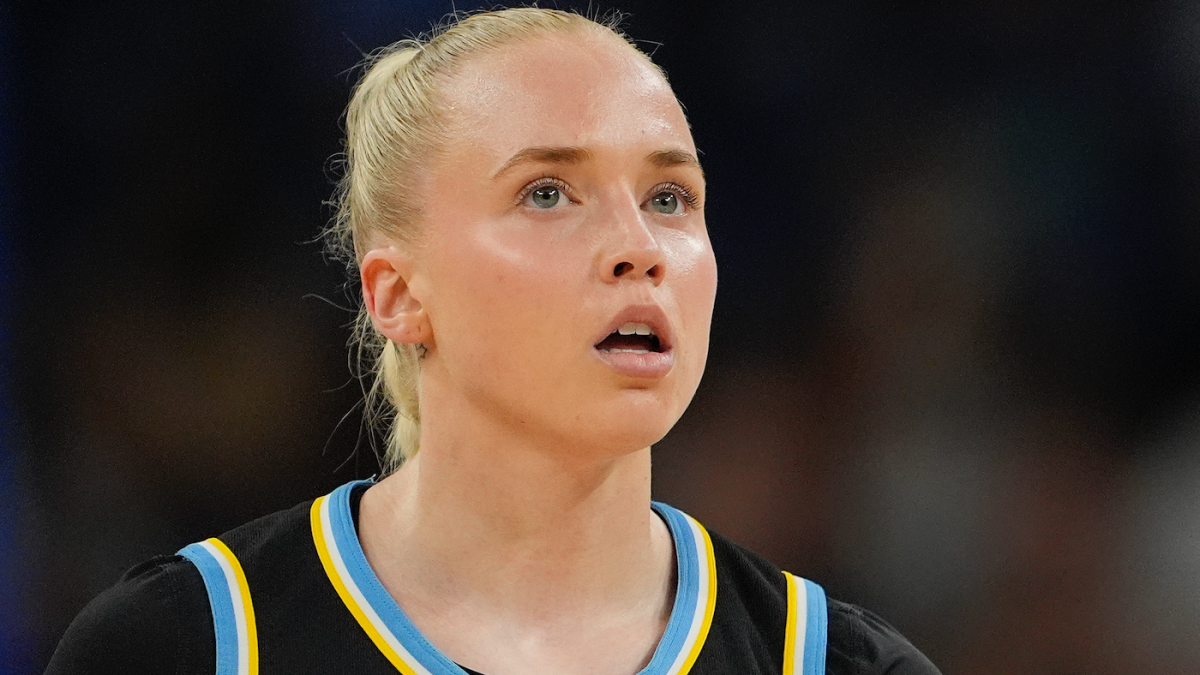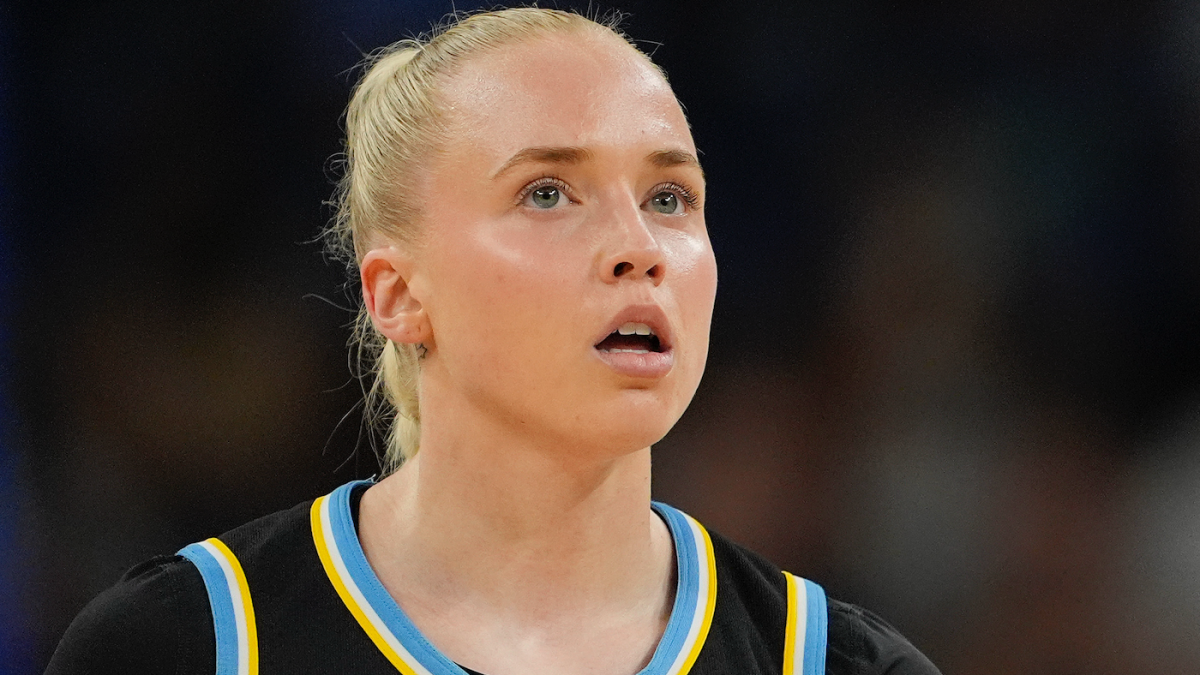A Storm in the WNBA
The WNBA is currently at a pivotal moment, where the convergence of rising star power, veteran influence, and heated debates has created a whirlwind of media attention and fan reactions. At the heart of this storm is Angel McCoughtry, a former star whose outspoken commentary has ignited a broader discussion about talent, popularity, and player safety. As McCoughtry pursues a comeback, her actions have revealed underlying tensions within the league, pushing the WNBA to confront critical issues that will shape its future.
The Initial Spark: Questioning Hailey Van Lith’s Position
The controversy began when Angel McCoughtry, a five-time WNBA All-Star, publicly questioned the legitimacy of Chicago Sky rookie Hailey Van Lith’s place in the league. McCoughtry’s comments, made on the “Let Her Shoot” podcast, suggested that Van Lith’s presence on the team was more due to her online popularity than her basketball skills. This critique touched on a sensitive nerve regarding the evolving dynamics of athlete recognition in the age of social media. While McCoughtry’s argument hinted at a concern that marketability might be overshadowing merit, the manner of delivery was widely perceived as unnecessarily critical and damaging.
McCoughtry’s initial remarks sparked immediate backlash, with accusations of being “nasty” and offering the “worst take of the WNBA.” Her subsequent clarifications on platforms like X (formerly Twitter) attempted to contextualize her remarks, but the initial impression proved difficult to shake. The incident highlighted the delicate balance between constructive criticism and harmful commentary, especially when directed at young athletes.
From Criticism to Protection: The Caitlin Clark Factor
The narrative took a dramatic turn when McCoughtry volunteered to act as an “enforcer” for Indiana Fever rookie Caitlin Clark. This offer came in response to an incident where Chicago Sky guard Chennedy Carter aggressively body-checked Clark, knocking her to the floor. McCoughtry’s declaration was a direct response to the perceived lack of protection afforded to Clark, the league’s highly publicized No. 1 draft pick.
McCoughtry’s pivot from criticizing a rookie to offering protection to another highlighted a complex motivation. She framed her desire to return to the WNBA as a mission to safeguard young players from overly physical play. McCoughtry explicitly stated she felt capable of providing that protection, referencing LeBron James’ continued success at age 40 as evidence that she, at 37 (later reported as 38), still possessed the skills and physicality to compete at a high level.
However, this offer wasn’t universally lauded. Some, like former NBA player Arenas, suggested that anyone acting as Clark’s protector would essentially become her “ride-along,” implying a potentially unhealthy dynamic. The debate underscored the broader question of how to balance competitive intensity with player safety and whether a veteran player should assume the role of a physical deterrent.
A Comeback Attempt Fueled by Controversy and Determination
Underlying McCoughtry’s vocal opinions and protective instincts is a clear desire to return to the WNBA. She has openly stated she “has never felt better” and is actively preparing for a potential comeback. Her recent association with the Minnesota Lynx, utilizing their facilities for recovery, suggests a serious intent to rejoin the league.
McCoughtry’s last significant WNBA stint was in 2022, but she has faced injuries that have hampered her ability to consistently play. Despite these setbacks, she remains determined to prove she can still contribute. The controversy surrounding her comments about Van Lith and Clark has, ironically, amplified her visibility and reignited discussion about her potential value to a team.
Her comeback attempt isn’t solely about personal ambition. McCoughtry believes she can still impact the game, both on and off the court. She’s a filmmaker and actively engages with the WNBA community, demonstrating a commitment to the league’s growth and evolution. Her multifaceted approach to her career reflects a deeper understanding of the modern athlete’s role, blending performance with advocacy and community engagement.
The Wider Implications: Toxicity, Talent, and the Evolving WNBA
The entire episode has sparked a wider conversation about the culture within the WNBA. Social media reactions have been intense, with some fans labeling the league as “more toxic than the NBA” in response to McCoughtry’s comments. This perception, whether accurate or exaggerated, highlights the need for constructive dialogue about player interactions, media scrutiny, and the pressures faced by athletes in a highly competitive environment.
The situation also raises fundamental questions about how talent is evaluated and rewarded in professional sports. McCoughtry’s initial critique of Van Lith touched upon the growing influence of social media and the potential for popularity to trump pure skill. While marketability is undoubtedly important, the core principle of meritocracy remains crucial for maintaining the integrity of the game.
The WNBA must navigate these complexities carefully, ensuring that rising stars are given the opportunity to shine while also respecting the experience and contributions of veterans. The league’s ability to balance these dynamics will be critical in shaping its future and solidifying its position as a premier destination for women’s basketball.
A League at a Crossroads
The Angel McCoughtry saga isn’t simply about one player’s opinions or comeback attempt. It’s a microcosm of the WNBA’s current state—a league brimming with talent, navigating the complexities of increased visibility, and grappling with questions of fairness and protection. The league stands at a crossroads, needing to balance the excitement of rising stars like Caitlin Clark with the respect and experience of veterans like McCoughtry.
The way the WNBA addresses these challenges will ultimately define its future. The league must foster an environment where constructive criticism is valued, player safety is prioritized, and talent is recognized and rewarded fairly. By doing so, the WNBA can continue to grow and evolve, becoming a beacon of excellence and inclusivity in the world of professional sports.
As the league moves forward, it must learn from the controversies and debates sparked by McCoughtry’s actions. The WNBA has the opportunity to set a new standard for how professional sports leagues operate, ensuring that all players, regardless of their experience or popularity, are treated with respect and given the chance to succeed. The future of the WNBA hinges on its ability to adapt and thrive in this ever-changing landscape, and the lessons learned from this storm will be crucial in shaping its path ahead.












